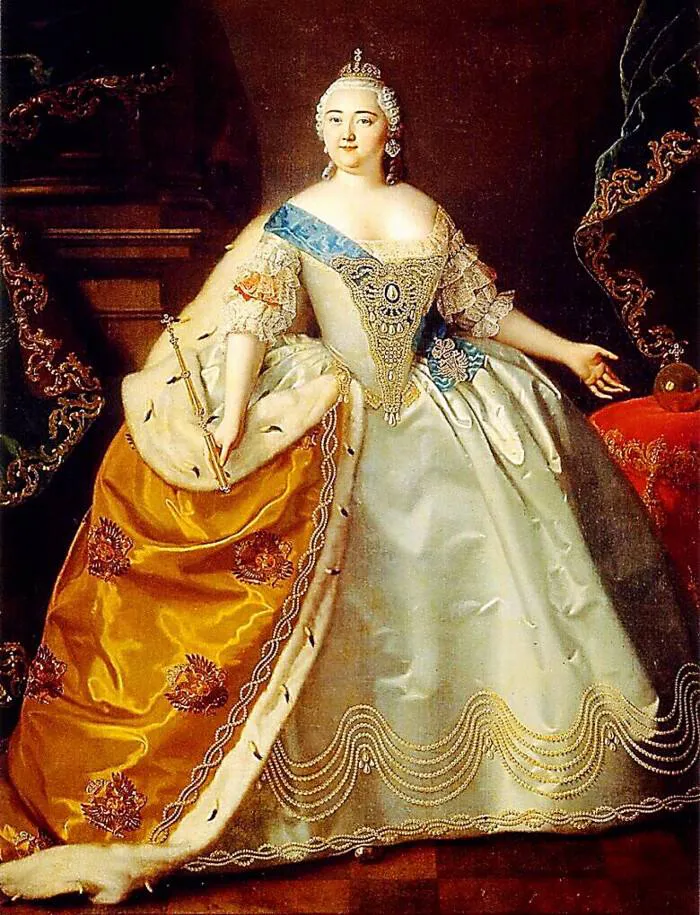At midnight on November 24, 1741, Regent Anna Leopoldovna slept soundly. A dark shadow approached her bed, tapped her on the shoulder, and said, "Little girl, it's time to get up." ”
On December 18, 1709, Peter the Great held a procession in Moscow to celebrate the great victory of Poltava, the defeated enemy of King Charles XII of Sweden.
Meanwhile, Elizabeth was born in The Kalominskaya Estate, a sprawling wooden palace on the outskirts of Moscow.
Elizabeth was the fifth child of Peter the Great and his serf-born wife. They had twelve children, six boys and six women, none of whom survived to be seven years old except Elizabeth and her sister Anna, who was a year older than her.
Elizabeth has been a beauty since childhood, with a lively personality and is very attractive. However, because his wife was a serf, Peter's wish to marry the French royal family did not come to fruition.
After peter the great's death, Elizabeth, with the help of her brother-in-law Charles Frederick, met Prince Charles Augustus and planned to get engaged.
Charlie Augustus contracted smallpox before they got engaged and died a few days later. Prior to this, Elizabeth's mother, Catherine I, also died of illness.
Not long after, her sister Anna also followed her brother-in-law out of Russia and went to Holstein.
At the age of seventeen, Elizabeth experienced the death of her mother and fiancé, the separation from her sister, and fell into loneliness and grief.
Elizabeth, who was cheerful by nature, understood that life would have to go on. She did not care about politics, lived a comfortable life, got along well with the new Emperor Peter II, and became his closest playmate.
On the night of January 11, 1730, Peter II, who was infected with smallpox and was terminally ill, died at the age of fourteen.
Elisabeth's French doctor, Armand Letoke, rushed into her room and gave her advice, telling her to get up immediately to find the Guards, appear before the people, rush to parliament, and then publicly proclaim himself emperor.
Instead, she sent Letoke away and continued back to the bed. Elizabeth, who was originally in the order of succession after Peter II, lost the throne at her fingertips.
Early the next morning, the Privy Council elected Elizabeth's thirty-six-year-old cousin, Anna, Duchess of Courland, as emperor.
However, Elizabeth was too dazzling, and despite her efforts to hide her light, the Empress was dwarfed in front of her.
Elizabeth's frivolity greatly annoyed Anna, her attraction to men made the Empress jealous, her good popularity upset the Empress, and the Empress's loyalty to her was unsure.
At one point, Anna was angered by various rumors about Elizabeth, and she threatened to imprison elizabeth in the convent.
Living under Anna's rule, suffering from Anna's hardships and oppression, Elizabeth never showed the ambition to become an emperor, but instead haunted the city like an ordinary person.
The British ambassador's wife had this to say of Elizabeth: "In front of outsiders, she always showed a frank and joyful look, and looked a little childish, but I heard that in private her conversation was very rational and convincing, and made me believe that her actions were nothing more than illusions." ”
In October 1740, Empress Anna died of a second stroke. Following Anna's will, Ivan VI, who was only two months old, ascended the throne, and Ivan the Younger's mother, Anna Leopoldovna, became regent.
The Prince Regent's suppression of Elizabeth was no worse than that of Empress Anna. Her words and deeds were restricted, her salary was constantly cut, and there were even rumors that the Prince Regent intended to throw her into the monastery and make her a nun.
In the early morning of November 24, 1741, Elizabeth's imperial physician, Lestock, came into her bedroom to wake her up and handed her a piece of paper.
Lestock painted two portraits of Elizabeth on both sides. On one side she sat in an imperial chair, and on the other she wore a nun's robe, with gallows and other execution racks behind her.
Elizabeth decided to act. In the bitter cold of the night, she led three hundred soldiers to the Winter Palace, and the guards on duty at the gate did not resist.
Elizabeth went straight to Anna Leopoldovna's bed.
At this time, the regent was still asleep. Elizabeth patted her on the shoulder and said, "Little girl, it's time to get up." ”
Seeing that the tide was turning, Anna Leopoldovna begged Elizabeth to turn a blind eye to the mother and son.
Elizabeth assured her that no one would harm anyone in the Brunswick family.
At 3 p.m. on November 25, 1741, Elizabeth returned to the Winter Palace, and at the age of 32, Peter the Great's daughter became Empress of Russia.
As the daughter of Peter the Great, it was a pity for Elizabeth to lose the throne three times. Especially on the night of Peter II's death, if she had listened to Letoke, she would not have been wronged in eleven years.
But as Elizabeth said years later, "I was still too young at the time." I'm glad I didn't take the throne so early. I was too young for my subjects to accept me. ”
Sometimes, losing isn't necessarily a bad thing. During these eleven years, Elizabeth grew up in adversity and became the empress who later made people submit.
Turn a blind eye to the difficulties and oppression of others and focus on what you like. Tighten your edge when the time is not ripe, and do what you can when you have the ability. People who can achieve things have a kind of cognition - know how to lie dormant.
#Reading # #女性 #
